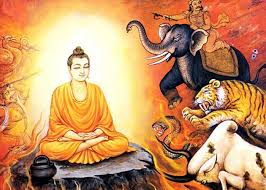
Christianity hasn’t died yet, and it never will, for there will always be a niche for slave morality anywhere there is interpersonal conflict. Fittingly for the receptive, yielding principle that it represents, Christianity has morphed into a near-infinite variety of different doctrines depending on the time and place in which it was trying to be relevant. This essay examines the characteristics of 21st century Christianity.
The sort of person who finds themselves attracted to a slave morality such as Christianity remains the same as ever, much like human nature itself. Their essential characteristic is resentment, and their essential motivation is the destruction of that which inspires envy in them. They are like pathological horizontalists, who want to level every dominance hierarchy out of resentment for not being able to climb them.
The Christianity of our century has found an equivalent for all of its ancient tenets and dogmas. For instance, in this new manifestation of Christianity, America are the Romans. Representing the men of iron, America has a vast military empire that brings humiliation and subjugation to its rivals. Anything that happens in the world, no matter where and no matter who to, can be blamed on American influence.
An Islamic suicide bomber who walks into a mosque in Pakistan and kills a hundred other Muslims has nothing to do with America. But neo-Christians will say that it’s still America’s fault because they “destablised” the country somehow, or because America gave money to some unsavoury politician somewhere alsong the line, or because the CIA financed the bomber, or equipped the bomber etc.
The neo-Christians rarely know anything about the Sunni-Shia divide and how murderous it has become. They don’t appreciate that a Muslim has a hundred times more to fear from a fellow Muslim than he does from the average American. It doesn’t matter to them. All Muslims are low status, and therefore they are elevated above the wealthy, c.f. “The first shall be last and the last shall be first.”
Similarly, the Original Sin is no longer sexual desire, because that has been fully monetised by now. The Original Sin is now racism, with racism being defined as solidarity with white people. All (white) people are guilty (of racism), and all have fallen short of the glory of (the colour-blind) God. We have all had thoughts about how we liked white people better, therefore we are all guilty of Original Sin, and are thereby associated with the Great Adversary of 21st century Christianity: Adolf Hitler.
The only solution for this Original Sin is self-flagellation. However, because corporal punishment isn’t fashionable in the Soy Era, this self-flagellation has to take a metaphysical form, and so the 21st century Christian gets their masochistic thrills from disparaging their own family, nation, race, class etc.
It has to be emphasised that Christianity doesn’t care for material concerns, and it never has. Inherent to Christian dogma is the meme that the cult comes above all other considerations, such as family, nation or class. So it’s natural for the 21st century Christian to say things like “White people have a uniquely brutal history of imperalism and racism.”
It’s therefore no accident that Christian churches are often behind the political impetus to allow hordes of Muslim and African refugees – who will never integrate – into the West. For thing, the Muslims also worship the God of Abraham, so they’re fundamentally on the same side as the Christians anyway, but more importantly, their arrival degrades the strength of the national bonds that people have with each other.
These national bonds are competing paradigms of solidarity to neo-Christianity and therefore have to be attacked so that it can take a central role in everyone’s life. Like its Abrahamic brothers in Islam and Judaism, Christianity is a totalitarian ideology, and it seeks to control every last aspect of the people under its thrall. This is why Jesus is quoted as saying in Matthew 10:34 that “Do not suppose that I have come to bring peace to the earth. I did not come to bring peace, but a sword.”
All other culture must be bulldozed out of the way to make sufficient space for Abrahamic universalism. This belief is as common among the 21st century Christian as is was of the Taliban who erased Afghanistan’s history of Buddhism, or of the Jews who rewrite Western history to glorify themselves and to hide their own crimes. All other bonds of friendship or brotherhood must be smashed, so that the God of Abraham stands unchallenged above the world.
*
If you enjoyed reading this essay, you can get a compilation of the Best VJMP Essays and Articles of 2017 from Amazon for Kindle or Amazon for CreateSpace (for international readers), or TradeMe (for Kiwis).



